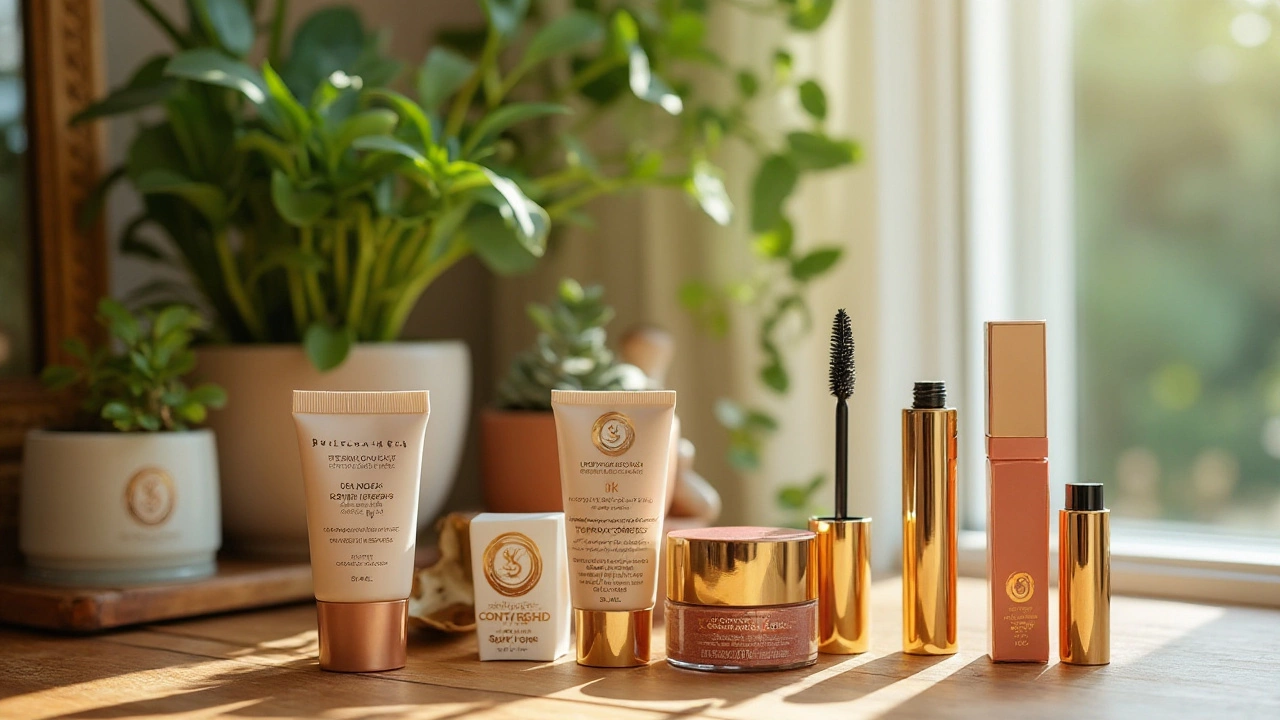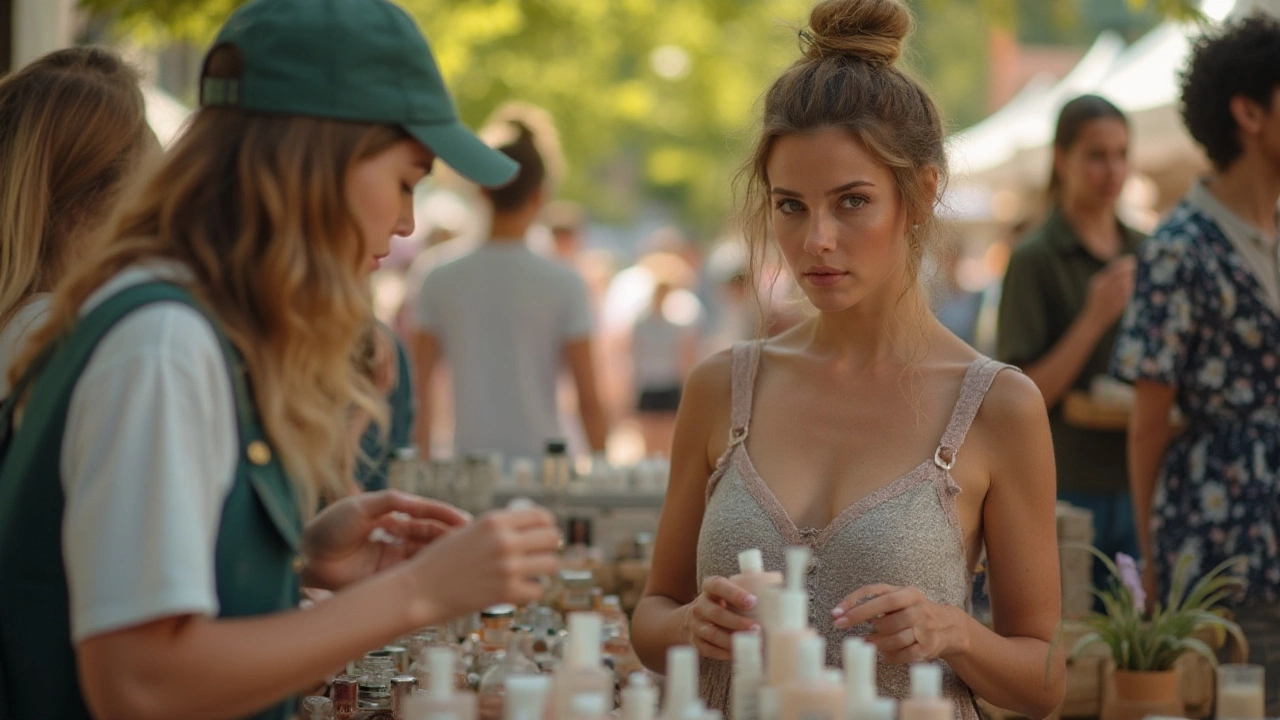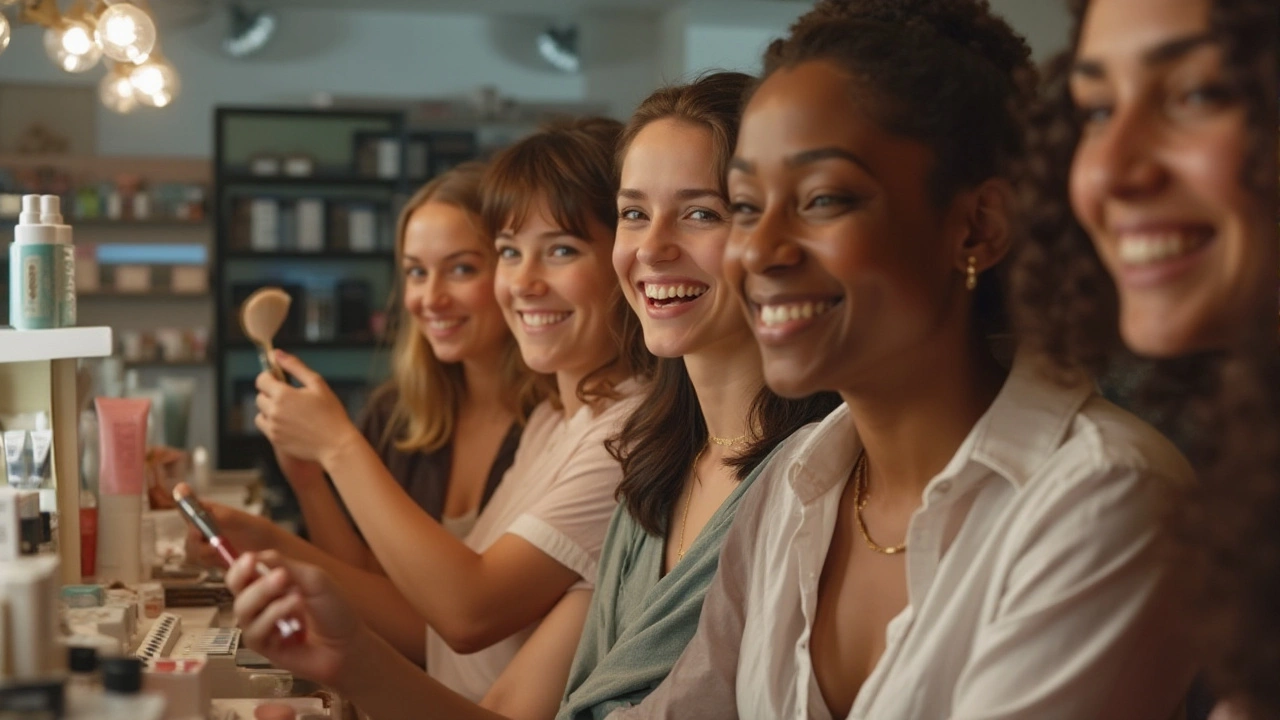As the world becomes increasingly aware of ethical concerns, many beauty enthusiasts are making the switch to cruelty-free makeup. This shift isn't just a trend; it's a movement towards more responsible and humane consumer choices. With the market overflowing with options, knowing which brands truly uphold these values can be challenging. Fortunately, there are indicators and certifications that help in identifying trustworthy companies.
Embracing cruelty-free products means supporting brands that choose not to test on animals, a practice that has unfortunately been part of the beauty industry for too long. By doing so, consumers play an active role in shaping a market that respects animal rights and champions sustainability. This guide will walk you through the necessity of cruelty-free beauty, highlight some of the pioneering brands in this space, and provide useful tips for those looking to make this ethical transition.
- The Importance of Cruelty-Free Makeup
- How to Identify Cruelty-Free Brands
- Popular Brands Leading the Way
- Lesser-known Brands to Explore
- Certifications and Labels to Look For
- Tips for Transitioning to Cruelty-Free Makeup
The Importance of Cruelty-Free Makeup
In today's world, the conversation around ethical consumerism has shifted significantly, spotlighting the necessity of opting for cruelty-free makeup. Many of us have had to confront the ethical implications of our beauty routines. It's more than just swapping products; it's about changing perceptions and making conscious choices. Animal testing, a practice once considered a standard in the industry, involves procedures that can cause immense suffering. As awareness grows, more consumers are questioning the need for such practices, particularly when alternatives exist. By championing cruelty-free products, we are advocating for the humane treatment of animals and promoting conscious consumerism.
Science has progressed enough to offer reliable alternatives to animal testing, such as in vitro testing and computer modeling. For many brands, transitioning to cruelty-free practices is not only possible but also economically viable. In fact, industry reports suggest a continuous rise in the demand for ethical cosmetics. According to a recent survey by the Humane Society, 74% of respondents expressed their preference for cruelty-free products, indicating a significant shift in consumer mindset. Choosing cruelty-free options supports brands that are committed to innovation and ethical principles, creating a ripple effect throughout the beauty industry.
Moreover, supporting cruelty-free brands contributes to a larger conversation about sustainability and environmental responsibility. Ethical beauty products often extend their commitment to the planet beyond animal welfare, incorporating eco-friendly packaging and cleaner ingredients. By reducing reliance on animal testing, we are not only respecting animal rights but also fostering a culture of moral responsibility. The move towards cruelty-free products can help reduce the carbon footprint associated with traditional beauty manufacturing, further appealing to consumers who prioritize sustainability alongside ethics.
Interestingly, the choice to buy beauty brands that are cruelty-free can be empowering. In a world where beauty standards are continuously evolving, making ethical choices reinforces the notion that beauty can be a form of activism. It's about aligning personal values with consumer habits and realizing the potential to drive positive change. As more of us turn to brands that share our ethical standpoint, the market naturally begins to shift, leading to an increase in the availability of cruelty-free options. This shift demonstrates the power of the consumer's voice in directing the future of the beauty industry.
"The greatness of a nation and its moral progress can be judged by the way its animals are treated." - Mahatma Gandhi
Another aspect to consider is the social influence of this movement. Celebrities and influential figures are often advocates for cruelty-free products, bringing broader visibility to the cause. By endorsing brands that shun animal testing, they help raise public awareness, encouraging their followers to do the same. This growing public advocacy plays a crucial role in inspiring change within the industry, pushing an increasing number of brands to reevaluate and revise their practices to meet the ethical demands of their audience.
The commitment to cruelty-free makeup is a step toward a more ethical world. As consumers, we hold immense power to influence this change. By staying informed and choosing brands that align with our values, we support the shift from outdated practices to modern, ethical standards. The beauty industry is responding to our demands, proving that conscious choices can indeed lead to a more compassionate world. In supporting cruelty-free products, we not only look good but also feel good, knowing that our beauty routine contributes to a kinder, more ethical global community.
How to Identify Cruelty-Free Brands
With the increasing desire to support cruelty-free makeup, one might wonder how to accurately identify brands that truly adhere to this ethical standard. It can feel daunting at first, navigating the various claims and labels, but a few practical steps can make the process simpler. The key is understanding what to look for and recognizing the signs of genuine commitment to animal welfare. Start by checking for widely recognized certifications on the product packaging. Symbols like the Leaping Bunny and PETA's cruelty-free logo are essential clues. These certifications ensure that no animal testing is conducted at any stage of product development, from the ingredients to the final formulation. Brands earn these certifications by adhering to strict standards, making them a reliable indicator.
Diving deeper, researching the brand's policy on animal testing on their official website often unveils significant insight. Transparent companies typically have a detailed section clarifying their stance on both finished products and ingredients. It's crucial to ensure that third-party suppliers refrain from animal testing, as some brands might indirectly bypass these ethics through outsourcing. In addition to this, online forums and beauty communities can serve as valuable resources. Engaging with fellow consumers’ experiences and reviews can shed light on potential discrepancies between brand claims and actual practices. It's often in these spaces where people share firsthand experiences with various beauty brands.
Another tactic involves using apps and online databases dedicated to cruelty-free products. These resources categorize brands and offer easy-to-navigate platforms for consumers to cross-check products before making purchases. By inputting brand names, you can quickly learn if they align with ethical cosmetics standards. Some tools also provide alerts on new certifications, keeping you updated with the latest in cruelty-free makeup advancements. Empowered with these digital aids, making ethical choices becomes effortlessly accessible.
"Choosing cruelty-free goes beyond compassion—it supports an industry evolution," remarked Emma Gjevre, a renowned animal rights advocate. Her words resonate greatly, driving home the broader impact of individual choices on the dynamics of beauty manufacturing and regulatory practices across the globe.
| Certification | Description |
|---|---|
| Leaping Bunny | Global recognition, ensures rigorous supply chain scrutiny for zero animal testing. |
| PETA's Bunny | Identifies brands that avoid animal testing and advocate for alternative methods. |
Despite the abundance of choices, it’s important to remain cautious of misleading marketing tactics like 'natural' or 'organic,' which do not guarantee a lack of animal testing. Such terms can mask underlying unethical practices. The beauty of modern consumerism lies in its participatory nature. As consumers, we wield the power to compel brands to uphold higher ethical standards. Taking proactive steps to verify claims and support genuinely cruelty-free brands directly influences the marketplace, paving the way for a kinder future in beauty.

Popular Brands Leading the Way
In the realm of cruelty-free makeup, certain brands have carved out a niche for themselves by staunchly opposing animal testing and championing ethical practices. Among such trailblazers is the renowned brand, Lush. Known for its fresh, handmade cosmetics, Lush has been vocal about its commitment to cruelty-free products since its inception. The brand not only avoids any form of animal testing but also uses recycled containers as a part of its effort towards sustainability. Such initiatives continue to earn them an ardent following among conscious consumers.
Another significant player in the cruelty-free domain is Too Faced. Established in the late '90s, Too Faced is an epitome of glamour meeting ethics. Their cosmetic line is entirely cruelty-free, creating vibrant and playful makeup that’s adored worldwide. In recent times, Too Faced has pledged to adopt vegan formulations across many products, ensuring a broader appeal among ethical beauty aficionados. This commitment sits alongside their advocacy for animal rights, making them a brand without compromise.
"Beauty without bunnies—isn't it time for that to be the standard?" muses an article from Ethical Consumer, highlighting the growing demand for animal-friendly products.
Tarte Cosmetics also stands out as a steadfast ally in this realm, captivating audiences with their commitment to both cruelty-free and high-performance naturals. They have seamlessly woven these values into an enticing tapestry of products from cosmetics to skincare. With each purchase, they not only deliver exquisite offerings but also a promise of ethical sourcing and zero cruelty—a feature cherished by many. Alongside a dedication to safe ingredients, Tarte ensures its entire collection aligns with ethical cosmetics initiatives.
Rising Stars in Beauty
Besides these established names, there are also newer, innovative brands that are capturing the attention of those who prioritize animal welfare. Beauty Bakerie, for instance, is rapidly climbing the cruelty-free ladder. Their delightful, dessert-themed packaging certainly catches the eye, but it is their pledge never to test on animals that truly sweetens the deal. The brand’s efforts to support underprivileged communities showcases their understanding that ethical beauty encompasses not just product but also community impact.
This movement within the beauty industry is more than a fleeting phenomenon. A report from the National Cosmetic Industry Symposium highlighted that 60% of new beauty consumers prioritize cruelty-free and sustainable products. The demand surge acts as a challenge for brands reluctant to undergo this ethical transformation. Not only is it a reflection of consumer consciousness, but it also underlines a pivotal change in how beauty is perceived across the globe. Encouraging larger companies to transition their lines to cruelty-free options is crucial as it significantly impacts industry standards.
Lesser-known Brands to Explore
Among the bustling universe of beauty brands, there lies an array of cruelty-free makeup companies that often escape the limelight but deserve your attention. These lesser-known innovators are stepping up with unique formulas, eco-friendly packaging, and effective products. First on our list is 'PHB Ethical Beauty,' a brand that's making waves not just for their cruelty-free commitment but their dedication to ethical sourcing and natural ingredients. Such companies give consumers the peace of mind that their beauty enhancers didn't cost an animal its welfare.
Another brand worth exploring is 'Au Naturale Cosmetics.' Known for their clean and ethical approach, they produce high-quality beauty products that are conscious of both the environment and your skin. Their focus on sustainability and transparency keeps their loyal customers returning for more. As their name suggests, they emphasize natural formulations that steer clear of harmful chemicals, while ensuring no animal testing is involved. It's inspiring to see a brand maintain integrity and efficacy together.
“The greatness of a nation and its moral progress can be judged by the way its animals are treated.” – Mahatma Gandhi
Then there's 'Emani Vegan Cosmetics,' which has carved out a niche for itself by producing 100% vegan and cruelty-free makeup. They're particularly beloved for quality products that cater not just to the ethical consumer but to those with sensitive skin too. With a mission that combines kindness and innovation, Emani constantly challenges the status quo by prioritizing ethical beauty without compromising on performance. Their popularity among conscious beauty shoppers continues to rise as they introduce cutting-edge and skin-friendly products.
Why Choose Lesser-Known Brands?
Choosing lesser-known brands often means supporting small businesses that are deeply committed to ethical practices. These brands usually have more control over their supply chains and can ensure rigorous no-animal-testing policies. This dedication can nurture a more sustainable and compassionate beauty industry. Moreover, supporting these brands signals to larger companies that consumers value ethics over tradition, pushing the entire industry toward more humane and Earth-friendly practices.
As this trend grows, expect to see more and more smaller brands emerging onto the scene, bringing with them innovation, authenticity, and a profound respect for the planet's creatures. Keep an eye on social media and beauty expos to discover emerging brands. The next time you're hunting for a new addition to your makeup kit, consider giving these hidden gems a chance to dazzle you with their principles and their products alike.

Certifications and Labels to Look For
Choosing cruelty-free makeup brands can seem overwhelming given the many options available. Yet, understanding certain certifications and labels can help clarify the decision-making process. Certifications are essentially delightful little badges of reassurance that the products we choose align with our values. One of the most recognized labels is the Leaping Bunny certification. Products bearing this logo are verified by the Coalition for Consumer Information on Cosmetics (CCIC) and adhere to stringent requirements proving they are truly cruelty-free. The program requires regular audits and trusted supply chain checks, making it a reliable indicator for ethical shopping.
Next is the PETA's Beauty Without Bunnies Program, which offers a comprehensive list of beauty brands committed to cruelty-free practices. While some argue the guidelines PETA applies are less rigorous than those of the Leaping Bunny, it remains an essential resource for ethical consumers. Having a wide range of products covered by their certification, from small indie brands to majors players, PETA's program is a comprehensive repository for cruelty-free choices. Moreover, all certified brands are barred from selling in regions with mandatory animal testing laws, such as mainland China. It’s pertinent to mention that some brands display both labels, which indicates a deeper commitment to ethical practices.
Knowing about certifications is vital, but it is equally important to stay informed about what lies behind these labels. Mindful shoppers often question whether suppliers in a brand's chain still engage in animal testing, even if the final products don't. Reading up on each organization’s criteria and approach can provide better clarity and ensure the brand aligns with personal values. Another worthy note is the Certified Vegan label, which assures that the product is not only free of animal testing but also doesn't contain any animal-derived ingredients, making it perfect for those who are pursuing a completely plant-based lifestyle.
The marketplace evolves, reflecting our ethical demands today more than ever before. Keeping a vigilant eye and becoming familiar with these certifications empowers consumers to make choices that lead to broader corporate changes.
“By supporting cruelty-free businesses, we are creating a market that values compassion over convenience,” explains a member of the Leaping Bunny program.Knowledge is power. By familiarizing oneself with these certifications, a meaningful and effective contribution to the well-being of animals and the environment becomes attainable. With the momentum this movement is gaining, the day when cruelty-free becomes the new normal isn't as distant as it once seemed. Seize your power as a consumer and let your voice manifest through ethical cosmetics choices.
Tips for Transitioning to Cruelty-Free Makeup
Switching to cruelty-free makeup can feel overwhelming at first, especially with the myriad of options available on the market. However, making this ethical shift is not only compassionate but also empowering, as you contribute to a kinder world. The first step is to educate yourself about what 'cruelty-free' truly means. It involves brands that do not engage in animal testing at any stage of product development. This is where certifications play a crucial role. Reputable organizations like Leaping Bunny and PETA offer verified cruelty-free labels. Research these certifications, as they provide a trustworthy guide in your decision-making process.
To start your journey, begin by auditing your existing makeup collection. This doesn't mean you need to throw everything out right away. Instead, take the time to go through each product, checking if the brands align with ethical cosmetics standards. As you use up products, gradually replace them with cruelty-free alternatives. This step-by-step approach is not only financially savvy but also allows for a smoother transition. You might be surprised by the range and quality of cruelty-free makeup available today, with many options that rival traditional brands you've always loved.
Jessica Alba, founder of The Honest Company, once said, "You have to do what you can, when you can, and celebrate the little victories." This approach can be incredibly reassuring when transitioning to cruelty-free beauty.
Another effective strategy is research and explore popular brands already leading the way. Many well-known brands, such as Fenty Beauty and e.l.f. Cosmetics, have gained a reputation for not testing on animals. By supporting these companies, you're casting a vote for ethical practices in the beauty industry. In addition, consider experimenting with lesser-known brands that specialize in cruelty-free and vegan formulas. Sometimes these hidden gems can become your new favorite staples, offering you unique and innovative products.
Creating a Cruelty-Free Routine
Developing a cruelty-free makeup routine can be an enjoyable experience if approached with flexibility and curiosity. Start by finding trustworthy online resources or communities that focus on cruelty-free and ethical cosmetics. Join forums or social media groups where like-minded individuals share their experiences, product reviews, and the latest news in cruelty-free beauty. These communities can offer support, understanding, and practical tips that can guide you in your newfound mission for compassionate beauty.Another helpful method is to create a wishlist or shopping list of animal testing-free products you're interested in. Having a list on hand when browsing beauty aisles or shopping online ensures you're prepared and reduces the risk of inadvertently picking up a product that compromises your values. Lastly, remember that transitioning to cruelty-free beauty is a personal journey. Celebrate each new purchase and discovery, knowing that you're contributing to a more ethical and compassionate world.
